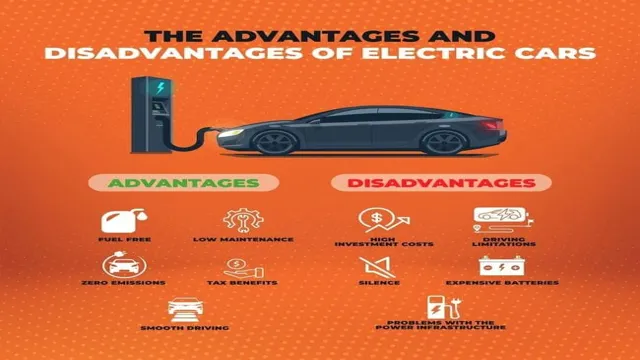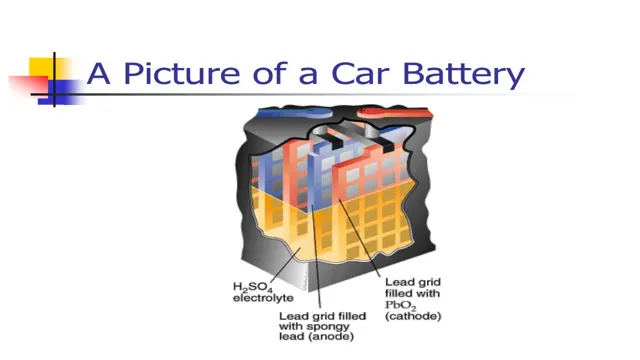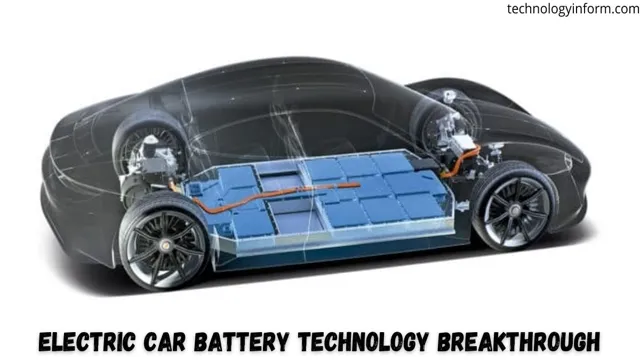The Shocking Truth: Weighing the Pros and Cons of Electric Car Batteries
Electric cars are becoming increasingly popular as people around the world look for ways to reduce their carbon footprint. These futuristic vehicles have a lot to offer, including pollution-free driving, excellent acceleration, and low maintenance costs. However, one of the biggest concerns people have about electric cars is the battery technology that powers them.
While electric car batteries offer plenty of benefits, like reducing the amount of harmful emissions we release into the atmosphere, they also come with a few downsides that are worth considering. In this blog post, we’ll explore the pros and cons of electric car batteries. We’ll discuss the benefits of electric car batteries, their drawbacks, and whether or not they’re a good choice for drivers looking to reduce their environmental impact.
So, buckle up and let’s dive into the world of electric car batteries!
Pros of Electric Car Batteries
Electric car batteries have shown a lot of promise in recent years, with some clear advantages over traditional engines. For one, they are much more efficient, with electric cars often achieving over 100 miles per gallon-equivalent (MPGe). This is partly due to the fact that electric motors are more efficient than gasoline engines (which waste a lot of energy as heat), but also because batteries can store energy more effectively than gasoline.
Additionally, electric car batteries emit no pollution, which is a huge plus for the environment, and they are much quieter than gas-powered cars, which can be a good thing for both drivers and pedestrians. However, there are also some downsides to electric car batteries, such as their high cost and limited range (although range anxiety is becoming less of an issue as technology improves). Overall, there is a lot of potential for electric car batteries, and they could play an important role in reducing our reliance on fossil fuels in the years to come.
No Emissions
Electric car batteries are becoming more popular due to their many benefits. One major advantage of electric car batteries is their no emissions feature. They do not produce harmful emissions that pollute the environment like gasoline and diesel cars do.
With electric cars, the battery powers the car, making it cleaner and eco-friendlier. This no emissions feature of electric car batteries is a big relief for the environment, as it helps reduce air pollution and contribute towards better air quality. Driving an electric car is not only a great experience, but it is also beneficial for our planet, making it a win-win situation for both the owner and the environment.
Electric car batteries are revolutionizing the automotive industry, and as they continue to improve, we can expect them to become the norm in the future.

Low Maintenance
Electric vehicles have gained popularity for their eco-friendliness, but they also come with low maintenance requirements. One of the pros of electric car batteries is their longevity. Unlike traditional car batteries, electric car batteries can last for thousands of miles without needing to be replaced.
Additionally, they don’t require regular oil changes, which saves car owners money and time. Electric car owners can also say goodbye to spark plug replacements, timing belts, and transmission fluids. Moreover, electric cars have regenerative braking systems that convert the kinetic energy generated during braking into electrical energy that can be stored in the battery.
This not only contributes to a longer battery life but also enhances the driving experience as the car can recover energy while slowing and extending the distance it can travel. All of these factors make electric car batteries low maintenance, which appeals to both the environment and the wallet.
Quiet Performance
One major benefit of electric car batteries is their quiet performance. Unlike traditional gasoline-powered cars that make a lot of noise as they run, electric cars produce very little noise. This makes for a more enjoyable and peaceful driving experience, especially in heavily trafficked areas where noise pollution is a major concern.
The electric motor in these cars operates silently, allowing drivers to fully appreciate the sounds of nature or their own music without any interruption. Additionally, this quietness can also be beneficial when it comes to reducing stress levels while driving. By eliminating the constant noise of a combustion engine, electric cars promote a more relaxing and tranquil driving experience.
Overall, electric car batteries provide a variety of advantages over traditional vehicles, and their quiet performance is just one of many reasons why consumers are making the switch to electric.
Efficient Energy Use
Electric car batteries have become one of the most promising energy-saving options out there. The benefits of electric car batteries outweigh their drawbacks. One of the most significant advantages is that they are environmentally friendly.
They don’t produce harmful gases that harm the environment, and they reduce the need for fossil fuels. The cost of running electric cars is also much lower than traditional gas-powered cars. Moreover, electric cars’ batteries have a longer lifespan than their gas-powered counterparts, which means that consumers don’t need to replace them as often.
The ongoing advancements in electric car batteries’ technology are also making them more efficient, durable, and cost-effective. Therefore, it’s not surprising that many governments around the world are incentivizing consumers to buy and use electric cars as part of their efforts to reduce carbon emissions. As a result, electric car batteries are an essential ingredient in enhancing energy efficiency in the coming years.
Reduced Fuel Costs
When it comes to electric cars, one of the major advantages is the significantly reduced fuel costs. Instead of relying on gasoline or diesel to power the vehicle, electric cars rely on electricity to recharge the battery. This means that drivers can avoid the ever-increasing price of gasoline and instead, benefit from the lower cost of electricity.
Additionally, electric cars can be charged at home, reducing the need to visit gas stations regularly. As a result, many electric car owners find that their overall transportation costs are significantly reduced. While the initial cost of purchasing an electric car may be higher, the long-term savings on fuel costs make it a wise investment for many people.
Not to mention, the environmental benefits of driving an electric car are numerous. In a world where sustainability is increasingly important, electric cars are a great way to reduce your carbon footprint and make a positive impact on the planet.
Cons of Electric Car Batteries
Electric car batteries have plenty of advantages, but there are also some cons to consider. One of the biggest disadvantages is the limited range that electric vehicles can travel before needing to recharge. Although this range is increasing with advances in battery technology, electric cars are still not as convenient for long road trips as gasoline-powered cars.
Another issue is the time it takes to recharge the batteries, which currently ranges from several hours to an entire day depending on the charging method used. Additionally, the production of electric car batteries requires a significant amount of energy and resources, including rare and expensive materials, which can have a negative impact on the environment. Finally, the batteries themselves can be expensive to replace if they fail or lose capacity over time.
These are all important factors to consider when weighing the advantages and disadvantages of electric car batteries.
Limited Driving Range
One of the biggest cons of electric car batteries is their limited driving range. Unlike traditional gas-powered cars that can cover hundreds of miles on a single tank, electric cars can only go so far before needing a recharge. While the range of electric cars has significantly improved over the years, it still remains a concern for many drivers.
Depending on the model and battery capacity, electric cars can typically cover around 100-300 miles before needing to be recharged. This limited range can be frustrating for drivers who need to travel long distances or those who live in areas with limited charging infrastructure. However, it’s important to note that electric cars are more suited for short to medium commutes and daily errands, and with advancements in technology, the range is expected to improve over time.
Long Charging Times
One of the biggest disadvantages of electric car batteries is long charging times. While traditional gas-powered vehicles can refuel within a matter of minutes, electric cars can take anywhere from several hours to an entire day to fully charge. This can be a major inconvenience for drivers who are used to the speed and convenience of traditional refueling.
Even with fast-charging technology, electric vehicles still require more downtime than gas-powered ones. This can be especially problematic for drivers who need to take long road trips or rely on their vehicle for work. Although electric car batteries have many benefits, the issue of long charging times is one that manufacturers are still working to address.
Until that time, electric car drivers will need to plan ahead and be patient when it comes to charging their vehicles.
Battery Replacement Costs
Electric car battery replacement costs are a major consideration for potential buyers. Although electric vehicles are gaining popularity due to their sustainability and cost-effectiveness, the batteries that power them require replacement after a certain amount of time. While advances in technology have extended the life of these batteries, they can still be quite expensive to replace.
The cost of replacing an electric car battery can easily amount to thousands of dollars, depending on the make and model of the vehicle. This is a major disadvantage when compared to the cost of replacing a conventional car battery, which typically costs less than $200. Additionally, the process of replacing an electric car battery can be complex and time-consuming, requiring a skilled technician.
This leads to longer wait times and increased costs. While the initial purchase of an electric car may be cost-effective, the eventual cost of replacing the battery may deter some potential buyers.
Conclusion
In conclusion, electric car batteries may have their drawbacks, such as limited range and dependence on charging infrastructure, but they also offer undeniable advantages. From reduced carbon emissions to lower maintenance costs, electric car batteries offer a more sustainable and affordable driving experience. So while there may be pros and cons to consider, one thing’s for sure: the future of automotive transportation is electrifying!”
FAQs
What are the advantages of using electric car batteries?
Electric car batteries are environmentally friendly, cost-effective in the long run, and require less maintenance than traditional combustion engines.
What are the disadvantages of using electric car batteries?
Electric car batteries are currently expensive to purchase and replace and have limited driving ranges compared to traditional cars.
How long do electric car batteries typically last?
Electric car batteries typically last between 8-10 years or around 100,000 miles.
Can electric car batteries be recycled?
Yes, electric car batteries can be recycled to recover valuable metals such as lithium and reduce environmental waste.




